Raspberries are edible fruits from plant species in the genus Rubus, part of the rose family. With the proper care, planting a raspberry brush pays off as they live and produce fruit for up to 20 years. Learning about raspberry companion plants is helpful to make sure your raspberries grow well and taste their best when it comes time to harvest.
Raspberry bush companion planting looks at what plants aid your raspberries by repelling insects and enriching the soil. In return, your raspberry bush may end up providing unforeseen benefits to adjacent plants creating a cooperative fruit or vegetable garden.
Raspberries do well when planted alongside a trellis—allowing them to grow vertically and opening up space nearby for you to plant beneficial companion plants. Growing raspberries on a trellis also makes harvesting easier, and the improved air circulation makes your plants more resistant to diseases.
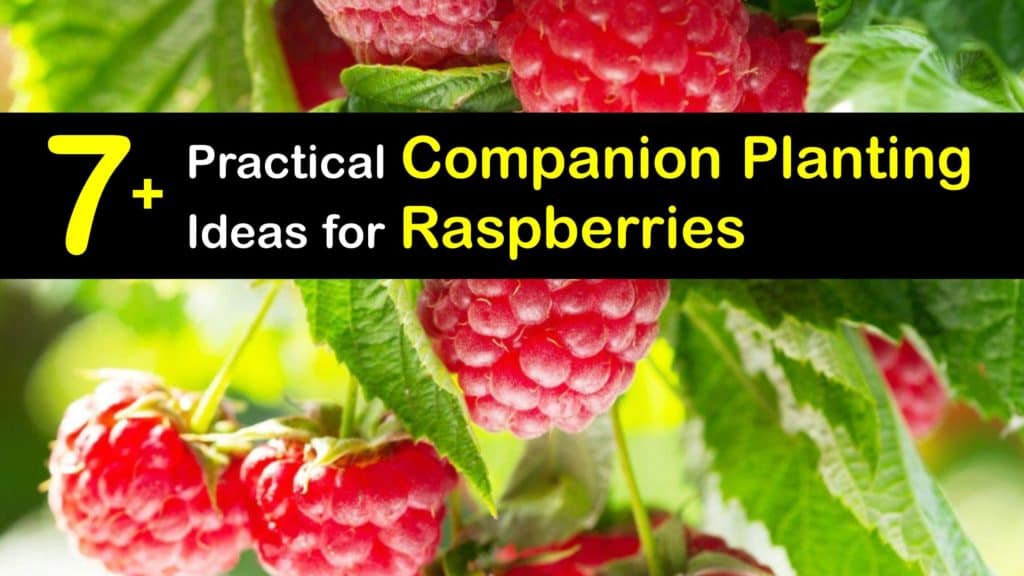
- What to Plant with Raspberry Bushes
- Plant Marigolds as a Cover Crop
- Repel Insects with the Odor of Alliums
- Lure Away Harmful Insects with Nasturtium and Chamomile
- Keeps Insects Away by Planting Rue
- Repel Harmful Insects with Chervil and Tansy
- Using Turnips and Yarrow to Repel Beetles
- Plant Raspberries Near Pine Trees
- Add Nutrients to the Soil with Beans
- Attract Pollinators with Borage
- What to Avoid When Companion Planting Raspberries
- Additional Raspberry Companion Plants
- Caring for Raspberry Bushes
What to Plant with Raspberry Bushes
When looking for what to grow with raspberries, find plants that benefit the growth of raspberries through either protection from the elements or pests that threaten your yield.
Growing plants that enjoy raspberries growing conditions like full sun is essential to keep in mind when sowing companion seeds. Companions for blackberries compared to raspberries are similar. Find what works for you and your available space.
The best place to plant a raspberry bush is one that you can enjoy and that allows it the proper growing conditions to thrive. Be sure to allow enough room for the plant to spread, depending on the cultivar.
Plant Marigolds as a Cover Crop
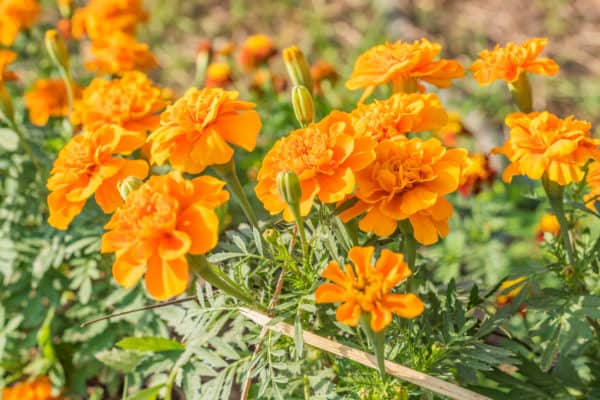
Raspberries thrive in slightly acidic soil full of organic material, so prepping your garden with a cover crop one season in advance helps ensure your raspberry bush has a great growing season. When you start harvesting your raspberries, you’ll be glad you planned ahead.
In addition to providing ground cover and nutrients to the soil for incoming raspberry bushes, marigolds effectively keep away pests like eelworms and nematodes. As a flower, marigolds attract beneficial insects like bees and butterflies that aid in pollination.
Repel Insects with the Odor of Alliums
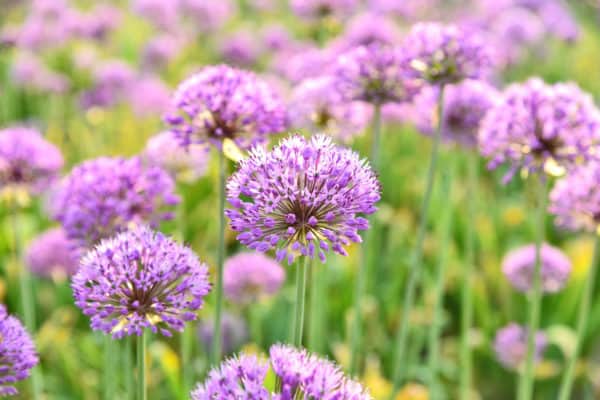
Like fruit trees, plants belonging to the Allium family work well with raspberry bushes to keep pests away as scents are essential factors in insects disturbing plants.

The purple flower blooms from chives attract pollinators like butterflies while keeping other harmful insects like spider mites away. Leeks, also part of the Allium family, serve as a natural insecticide for raspberry plants by repelling Japanese beetles with their smell.
Lure Away Harmful Insects with Nasturtium and Chamomile
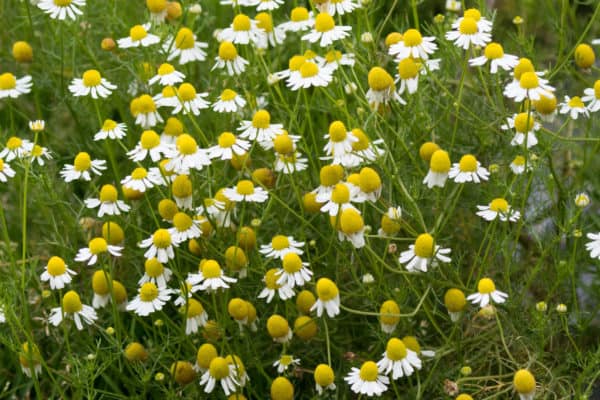
Nasturtium is often used as a trap crop, meaning they lure in harmful insects like aphids and squash bugs and keep them away from other crops you’re growing. To repel squash bugs and keep them away, grow nasturtiums nearby. Like other flowering plants, nasturtium also draws in pollinators and natural predator bugs for pests.
Adding chamomile to your garden provides color and repels flies and ticks away from other vital crops you want to protect.
Keeps Insects Away by Planting Rue
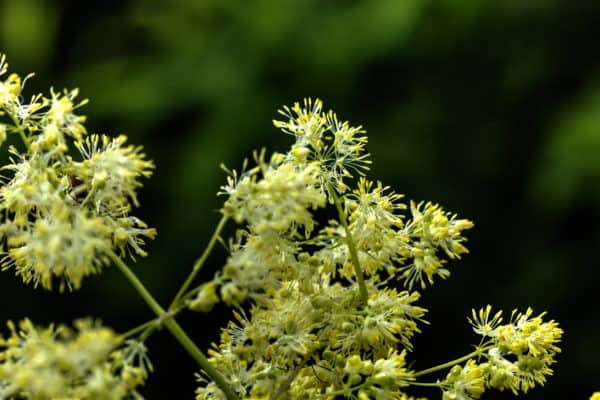
Rue is an herb known for its bluish-green leaves and yellow flowers. Due to its bitter taste, rue is not commonly used in cooking but still holds relevance as an ornamental plant and a beneficial companion to other plants.
Rue’s strong smell deters cats from entering gardens and keeps away aphids, flea beetles, and snails.
Repel Harmful Insects with Chervil and Tansy
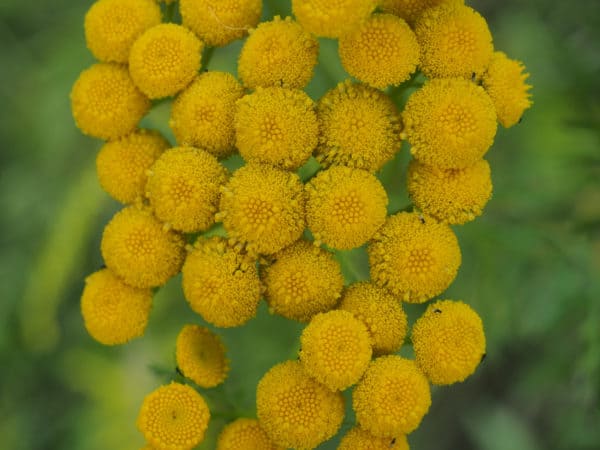
Chervil is a plant that enjoys lots of shade, so planting it under your raspberry plants creates a perfect pairing.
While your raspberry plant protects chervil from the sun, chervil keeps pests like Japanese beetles, aphids, and cucumber beetles away from your raspberry plant. Tansy deters moths, mosquitos, and other insects.
Using Turnips and Yarrow to Repel Beetles
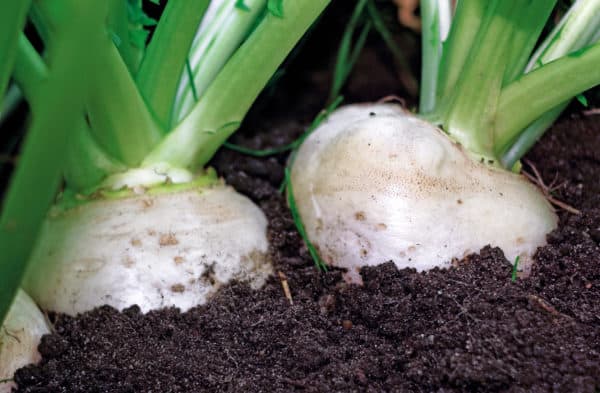
When you plant raspberries, it’s a great time to plant with turnips, too. Turnips are a trap crop you may want to consider adding to your garden’s defense line for your fruiting raspberry bushes. Harlequin beetles enjoy snacking on raspberries as well as members of the cabbage family.
In addition to helping repel beetles, yarrow attracts bees to your garden to aid in pollination and increases harvest yields. Yarrow adds essential nutrients in your compost heap for future gardening efforts, too.
Plant Raspberries Near Pine Trees

Pine trees might seem like an odd choice when looking for raspberry companions, but if you have space or a pine or evergreen tree growing nearby, it may be time to rethink your raspberry bush planting location.
Once they fall, pine needles break down and add essential nutrients to the soil for nearby plants, and evergreen trees add acidity to your soil. Raspberry bushes grow like soil with a pH of 5.5-6.5, so planting near these trees can provide an easy boost in acidity to help your raspberries thrive.
Add Nutrients to the Soil with Beans
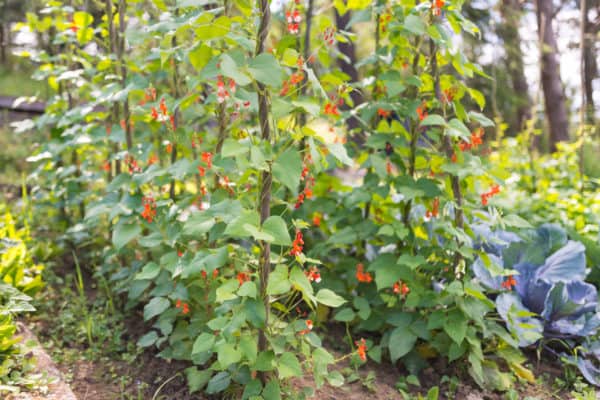
When crops grow, they absorb nutrients from the soil to aid in their growth. This process creates extra work for you, the gardener, at the end of the season to renew the health of your soil for the next growing season.
Adding beneficial plants like pole beans or bush beans helps eliminate some of this extra work. Beans add nutrients back into the soil, allowing plants in the area to remain healthy and continue growing with nutrient-packed soil.
Attract Pollinators with Borage
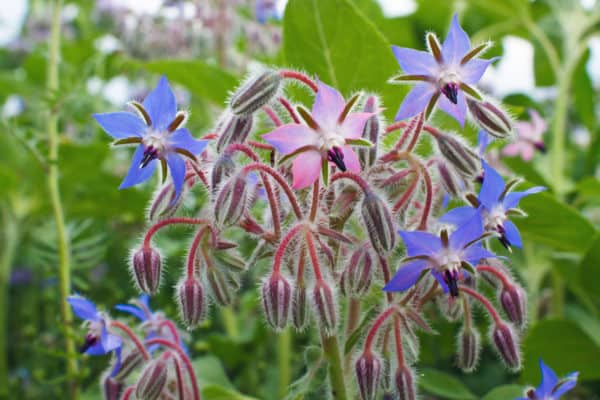
Although beneficial insects like bees and ladybugs enjoy pollinating, they may require an incentive to visit your garden. Plants like borage encourage these pollinators to visit your garden and pollinate your flowers, increasing your eventual harvest.
What to Avoid When Companion Planting Raspberries
When looking for what to plant with raspberry bushes or if you grow raspberries from store bought fruit, remember that not every plant works well as a companion. Some plants may draw in harmful insects or affect the growth of your raspberry bush by draining the soil of essential nutrients.
Here are a few plants to avoid planting near your raspberries, as well as things to keep in mind when sowing seeds.
When companion planting raspberries, never plant new raspberry plants where you’ve grown one in the past or near brambles. Wait at least five years before planting another raspberry plant in the exact location to avoid fungal diseases, nematodes, or pathogens left in the soil.
Avoiding planting raspberries near nightshade plants like eggplants, tomatoes, and potatoes to reduce the risk of verticillium wilt infecting your bushes. Although oregano does repel insects, it also attracts aphids, spider mites, and leafhoppers, so we do not recommend planting oregano around your raspberries.
Keep Fennel Away from Raspberries
Fennel is a favorite for some because of the yellow flowers it grows that attract butterflies, but fennel is not kind to its fellow plants. Fennel secretes a substance from its roots that inhibits the growth of plants growing near it.
Most plants are bad companions with fennel. Dill remains one of the few plants farmers say grows well alongside fennel, but the risk of cross-contamination makes this an unwise decision.
Additional Raspberry Companion Plants
Raspberries are great to pair with other plants; however, many of their companion plants provided similar benefits to other plants listed here. Having many beneficial plants to grow under raspberries gives you many options for crafting the ideal vegetable garden.
Plan your garden additions based on benefit and personal preference for what you’re hoping to bring to the table when it comes time to harvest. Grow raspberries next to radishes to help loosen the soil or summer savory to repel bugs. Or, plant with zucchini or broccoli for some veggies to go with your tiny fruits. It’s all up to you.
Caring for Raspberry Bushes
While adding beneficial plants takes your gardening to the next level, it is essential to know what your plant needs to thrive. Aside from standard benefits provided by companion plants, you want to ensure your raspberry bushes are healthy and growing well. Proper raspberry plant spacing is important, as is care for bugs and disease.
Adding Much to Your Raspberry Bushes
If you experience severe temperature changes in your growing zone, have a plan to protect your plants. Mulching your raspberry bushes is an easy way to protect the roots of your bushes from fluctuating temperatures.
Adding mulch to your bushes also helps maintain the moisture level, reduces the amount of watering required from you, and keeps weeds to a minimum.
Prep the soil around your bushes before adding any mulch by loosening the ground with a gardening hoe and removing weeds. Avoid going too deep into the soil so you don’t damage raspberry bush roots.
Spread mulch material like straw mulch over the soil using a rake to create an even layer of straw between eight and ten inches deep. Avoid placing mulch too close to the stems of your raspberry bush, as this may cause your plant to rot and die.
Applying Fertilizer
Keep an eye on the health of your raspberries. Make your own organic raspberry bush fertilizer as needed. Note that when your mulch material begins to decompose, it may cause your soil’s nitrogen supply to lower.
To combat this, fertilizer your raspberry bushes with ammonium nitrate to replenish your soil. Ammonium nitrate is a popular choice by home gardeners as it is a readily available source of nutrition for plants.
When applied to soil, the nitrate moves with water to the plant roots, making it ready for the plant to absorb. The ammonium is taken in by the roots or converted to nitrate by microorganisms in the soil.
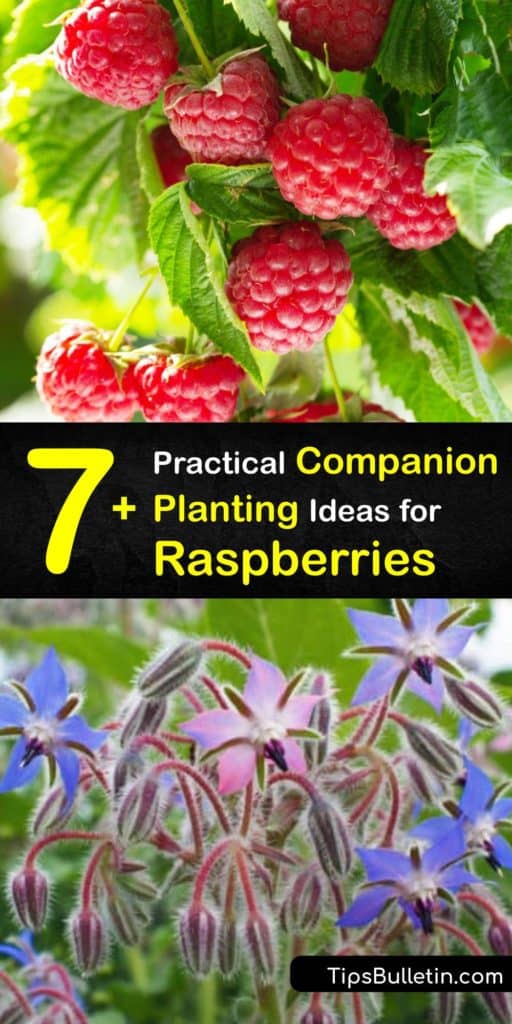
If you found our tips for raspberry companion plants helpful, please share this article on companion planting raspberries on Facebook and Pinterest with those who may wonder what to plant with raspberry bushes.